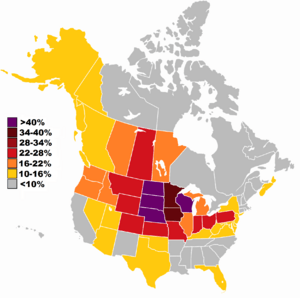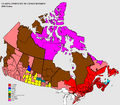German Canadians facts for kids

German Canadians % of population by area
|
|
| Total population | |
|---|---|
| 3,322,405 (by ancestry, 2016 Census) |
|
| Regions with significant populations | |
| Ontario, Western Canada, Atlantic Canada, Quebec | |
| Languages | |
| English, French, and German | |
| Religion | |
| Lutheran, Roman Catholic, Anabaptism (Amish, Mennonite, Hutterite) | |
| Related ethnic groups | |
| Germans, German Americans, Austrian Canadians, Swiss Canadians, Luxembourgish Canadians |
German Canadians are Canadian citizens who have German ancestors. This means their families originally came from Germany or German-speaking parts of Europe. They are one of the largest ethnic groups in Canada.
Contents
Who are German Canadians?
German Canadians are people living in Canada whose family roots are in Germany. Many of them speak English or French, but some also speak German. They have brought many traditions and ideas from Germany to Canada.
Where do German Canadians live?
German Canadians live all across Canada. However, many of them live in Ontario and the Prairie provinces like Manitoba, Saskatchewan, and Alberta. You can also find large communities in British Columbia and Atlantic Canada.
A Look at German Canadian History
German people have been coming to Canada for a very long time. Their journey to Canada started centuries ago.
Early German Settlers in Canada
The first German settlers arrived in Canada in the 1700s. Many came to Nova Scotia to help build new towns. They were often farmers or skilled workers. These early groups helped shape the communities they joined.
The Arrival of the Foreign Protestants
In the mid-1700s, many Germans and other Europeans were called "Foreign Protestants." They were invited to settle in Nova Scotia. They helped establish towns like Lunenburg, which still has strong German roots today.
Waves of German Immigration
Over the years, more Germans came to Canada in different waves.
- 1800s: Many Germans came seeking new farmland and opportunities. They settled in places like Waterloo County in Ontario.
- Early 1900s: More immigrants arrived before and after the World Wars. They often looked for peace and a better life.
- After World War II: A large number of Germans moved to Canada. They helped rebuild Canada's economy and industries.
German Canadian Culture and Traditions
German Canadians have kept many of their cultural traditions alive. These traditions add to Canada's diverse culture.
Language and Religion
While most German Canadians speak English or French, some communities still use the German language. Many German Canadians are Lutheran or Roman Catholic. There are also groups like the Mennonites, Amish, and Hutterites, who have unique traditions and often speak older forms of German.
Food and Festivals
German Canadians enjoy traditional German foods like schnitzel, sausages, and pretzels. They also celebrate festivals like Oktoberfest, which is a big party with music, dancing, and food. These events are a fun way to share their heritage.
Contributions to Canada
German Canadians have made many important contributions to Canada. They have helped build the country in many ways.
- Farming: Many German immigrants were skilled farmers. They helped develop Canada's rich agricultural lands, especially in the Prairies.
- Industry: German Canadians have worked in many industries, from manufacturing to technology.
- Arts and Science: They have also contributed to Canada's arts, music, and scientific discoveries.
Images for kids
-
Little Dutch (Deutsch) Church - oldest German church in Canada (1756), Halifax, Nova Scotia
-
A family of German immigrants to Quebec City in 1911.
-
People who have self-identified as having German ancestors are the plurality in many parts of the Prairie provinces (areas coloured in yellow).
See also
 In Spanish: Inmigración alemana en Canadá para niños
In Spanish: Inmigración alemana en Canadá para niños





